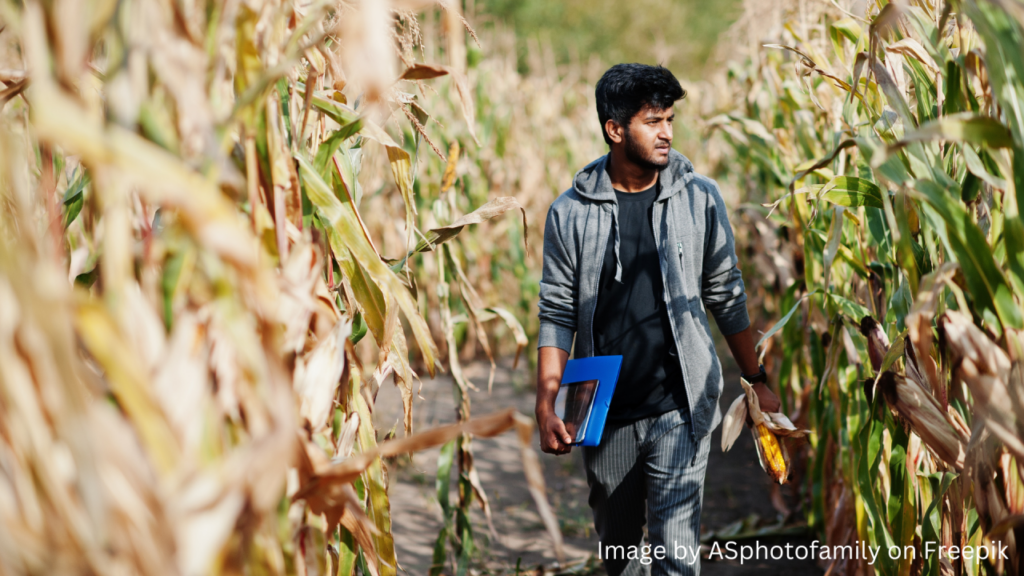Agriculture plays a pivotal role in the Indian economy. It supplies 18% of the materials consumed or required to make goods and employs half of India’s population. But, even with these incredible numbers, farming in India must deal with many problems that stop it from growing. This blog talks about the biggest challenges that Indian farming is dealing with.
Small and fragmented landholdings
• Most farms in India are smaller than 2 hectares in size. Individual farmers find it unaffordable to use technology to increase productivity and efficiency.
Climate Change Impact
• Climate change alters weather patterns, resulting in natural calamities. Weather disasters such as floods and storms caused significant agricultural area damage in India between 2015-16 and 2021-22.
Dependence on Monsoons
• Monsoon rain is responsible for 80% of Indian agriculture. Water scarcity is caused by unsteady rainfall seasons with extensively exploited and decreasing water levels. As a result, crops suffer and economic losses are significant.
Poor irrigation facilities
• There is a significant problem in India, where cultivation consumes 80% of available water. This includes using too much groundwater and solely employing current techniques like micro-irrigation, which only covers around 18.8% of the area.
Lack of mechanization and modern technology
• Despite certain advancements, majority of Indian farming is still done by hand. Expensive pricing and the necessity for more easily accessible financing restrict individuals from adopting new technology. This has an impact on productivity.
Soil Fertility Depletion
• Urea will account for more than half of all fertilizer produced and utilized in India by 2023. The overuse of chemical fertilizer following the Green Revolution has deteriorated the soil, resulting in low output.
Lack of transportation and storage facilities
• High transport costs, poor road connection, and intermediaries that defraud farmers are major issues in the farming industry. Every year, approximately 16% of fruits and vegetables deteriorate due to a lack of suitable storage facilities.
Price Volatility
• Market fluctuations make it difficult for small farmers to earn a consistent income. This makes agricultural planning and investment challenging.
Poor training and extension facilities
• Many farmers struggle to innovate and adapt due to a lack of information and training. They are unaware of the most recent farming techniques or tools, which may limit their revenue sources.
Inadequate Access to Credit and Insurance
• Obtaining low-cost finance and insurance remains a significant challenge. According to NABARD, the conventional banking system can only lend to 30% of farmers. This leaves many at the mercy of expensive informal choices.
Conclusion
The challenges that Indian farming is now dealing with are many and complex, having the most significant effect on small farmers. Solving these issues looks difficult, but there’s hope for improvement if corporations, agritech startups, government agencies, and local communities get together. Implementing Israel’s Kibbutz model addresses agricultural challenges in India through innovative practices. The model offers potential solutions for addressing agriculture issues in India by promoting advanced farming techniques. These include precision agriculture, efficient water management, and technology-driven practices like drip irrigation and greenhouse farming. The emphasis on knowledge-sharing and communal collaboration within kibbutzim can enhance Indian farming practices, improving productivity, sustainability, and resilience to challenges such as water scarcity and climatic variations. Implementing elements of the Kibbutz model in India could contribute to the modernization and optimization of the agricultural sector.
Be a part of Revasa Farms’ effort to change Indian farming. Join in, learn more, and help make a promising future for farmers in India. For more details and to find out how you can work together, contact Revasa Farms at vaibhav@revasafarms.com.
References:

